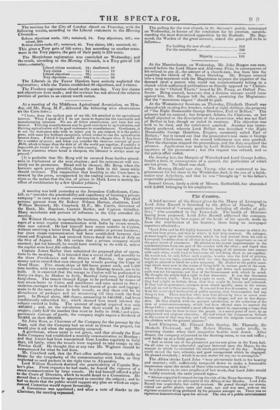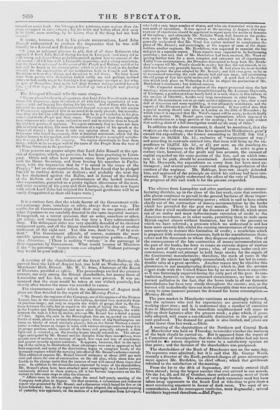Cbc Countrn.
A brief account of the dinner given by the Mayor of Liverpool to Lord John Russell is furnished by the Albion of Monday. The party consisted of "seventy gentlemen, including all shades of poli- ties ; " who assembled in the Town-hall. The health of Ministers having been proposed, Lord John Russell addressed the company. The following is the best report of the heads of his speech, made up from the recollection of his hearers; there being no newspaper reporters admitted- "Lotd John said he felt highly honoured, both by the manner in which the toast had been given, and that in which it had been received. Ile enlarged, at some length, upon the satisfaction which lie had derived from his visit to Liverpool, his admiration of all that he had seen, aud her importance as one of the great marts of commerce. He alluded to the recent improvements in the communications from one part of the country with the other ; and hoped that this annihilation of time and space, this hi:aging of all interests into contact with each other' would tend to harmonize all, and bring them to act together. He would not, Im said, before such a party, wander into the Geld of politics, but there wits oue topic, connected with his own department, upon which he might he allowed to dwell for a few moments. He alluded to the public meet- ings which %vete now in the course of being held in various part, of the coon try. There were some, perhaps, who would put dowu such meetings. But such was not his opinion., nor that of the Government with which he acted. He thought the people had a right to free diKcussion. It was free discussion which elicited truth. They had a right to meet. If they bad grievances, they hail a right to declare them, that they might be known and redressed. If they hail no grievances, common sense would speedily coins to the rescue, and put an end to these meetings. It W18 not from flee discussion, it was not from the imemicked declaration of public opinion, that Governments bad any thing to fear. There was fear when men were driven by force to secret com- binations. There was the fear—three was the danger, and not in free discus- sion. He then alluded, with the greatest satisfaction, to the reduction of the item of secret-servieemioney, which hail been effected since he entered the Home Orlice ; and concluded a most effective speech by expressing a hope, that moeh would soon be done to raise the people, in a moral point of view, by an enlightened and seligious education. Ile had visited the Corporation Schools in the course of that very day, and had witnessed the religious instruction of the children with the greatest pleasure."
Lord Ehrington, Mr. Edward John Stanley, Mr. Thornely, Sir Hesketh Fleetwood, and Mr. Robert Hutton, spoke briefly, in returning thanks when their respective healths were drunk. After dinner, the company adjourned to the drawing-room, to tea and coffee ; and broke up at a little past eleven. "And so ended one of the pleasantest parties ever given in the Town-ball. On all sides we hear unbounded applause bestowed upon the Mayor, for the manner in which he conducted the whole proceedings of the day. Nothing could exceed the tact, urbanity, and good management which he displayed. He pleased everybody ; which is no easy matter for any one to accomplish. '
The Albion thinks Lord John "very aristocratic both in his bearing and manner; still, sufficiently tempered down to make a favourable impression upon the minds of those who converse with him." In reference to its own prophesy of last week, that Lord John would be coldly received, the same journal says- " Silence reigned in Liverpool during the visit of the Home Secretary. Things turned out exactly as we anticipated in the Albion of last Monday. Lord John Russell was respectfully, but coldly received. He passed through our streets, visited our public places, came and went, NM and was seen, without the slightest sensatiou being produced by his preseoce amongst us. There was no rapturous denionsuatioa upon his arrival. The idea of a public entertaiameat entered no 11131I'S bead. On 'Change, a few partisans, more zealous than dis- creet, attempted to raise a shout ; but the feeble and hollow effort died away in its birth, more startling, by its failure, than if the thing had not been rs:ayed."
It seeme, however, that in his private conversations, Lord John Russell endeavoured to produce the impression that he was still ftieedly to a Liberal and Reform policy-
" Lives us unfeigned pleasure to add, that of all those Reformers who approa:I.:d Lord John Russell during his stay. in Liver pool, (and many did so with streng and almost bitter prijudices excited against hint on account of the l.ite session.) all left him with a rvourable impression, and a strong conviction, that his heart is yet ,,o,ed in the cause of the People and Reform, and that he y, iii stii be foiled in his natural hwe, rehich is at th,.ir head, in the further stri.aela for the amelieration of our institutions both in Church and State. We reiaice to hear thi:s.: things, and we rejoice to tell them. We have heard them from parties who themselves looked coldly on, and perhaps inclined others to look coldly on, at his lordship's first appearanc amongst us, but who, :n se:te of themselves, have regain had their warmer feelings excited towards it ,r/ Meer hop.:s fur tV future kindkd rip into a bri.yht and glowing
The Liverpool Chronicle tells the same story- " are ;leased to hear in all quarters, that Lord John Russell made a most favour,,Ide iii erosion upon the minds of all who had any opportunity of con- rer,i,.; with and hearing him during his late visit. And of those who have so info t toed us, many Reformers,diicontented beyond nreaiure at the late session
.Portiameut, approached him in no mood to be easily pleased ; but neverthe- less, they also lett him with the conviction that he is yet unshaken in his firm ancre,',.pcnt to Me Peopb and their cause. We rejoice to hear this, especially from witnesses who were more inclined to cavil and to criticize than to bestow the slightest porno', of applause. We regret extremely that we have not been able to obtain any thing like even the skeleton of a report of his speech at the Toevu.hall dinner ; but there is only one opinion about it, amongst the Helot Men who heard it,—namely, that it breathed sentimeuts which did the highest honour to the speaker, and were calculated to glee unurinyled satisfac- 604 Fe c'ery Laura in the country. We rejoice exceedingly to hear these thing:-. which make us augur well to the cause of the People from the tour of the Home Secretary in the provinces."
(Few persons are greater adepts than Lord John Russell at the spe- cies of deception, which, we perceive, he has been practising in Liver. pool. Often and often have persons come from private interviews with the Home Secretary, and from hearing his speeches in Perna- meat, with the impression that he " is sound in the cause of the People ; " but on close examination, it has been found that he pledged himself to nothing definite or distinct ; and probably the next day he has declaimed against the Ballot, and in favour of the finality of the Reform Act and the predominance of the landed interest. One expectation, grounded on a pretty vigilant observance of the man, and strict scrutiny of his party and their tactics, is, that the new hopes with es Lich Lord John has inspired the Liverpool gentlemen will be as surely disappointed as their old hopes were.)



























 Previous page
Previous page